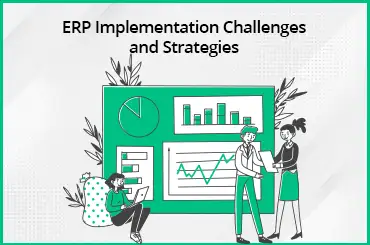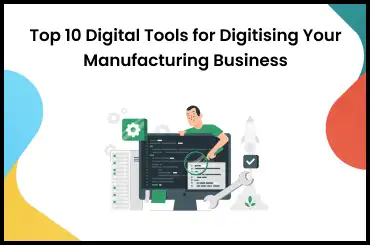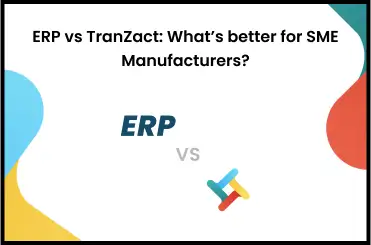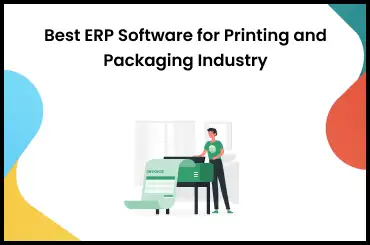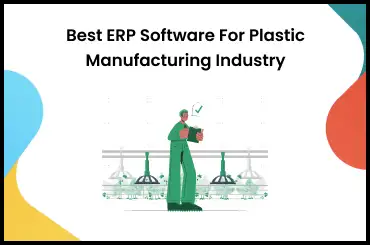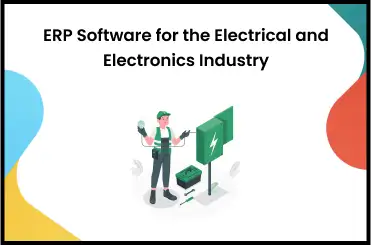Adopting ERP for the automotive industry is an important tool to streamline process planning in order to keep up with rising market demands. There are few industries as important to the economies of so many countries as the automobile industry. In addition, the automobile industry is crucial to the efficient distribution and transportation of goods for modern businesses.
In this article, we shall cover the meaning of Enterprise Resource Planning (ERP), the challenges faced by the automobile industry, and the top factors to keep in mind before adopting ERP software for the automobile industry.
What Is ERP?
ERP is a suite of applications used by businesses to coordinate and automate a wide variety of back-office operations. ERP may automate a wide variety of business functions, including accounting, project management, procurement, supply chain operations, corporate performance management, risk management, and compliance.
Thus, an ERP solution for the automotive industry aids in the management of day-to-day corporate activities by facilitating the flow of data between a wide variety of business processes. ERP systems ensure data integrity by removing duplicates from your company's common transactional data by gathering it from different sources.
The Importance of ERP in the Automobile Sector
The automotive sector is poised for great success, but the sheer number of companies involved makes it a challenge to keep track of their day-to-day operations. It's also time-consuming to maintain an eye on everything to make sure the business runs smoothly and efficiently.
Assembling, polishing, testing, and a host of other processes are all integral to the automotive industry's production process. The automotive sector must use ERP in order to streamline the monitoring and control of all these processes.
The product, together with the smooth operation of the ideal quality, quantity, production flow, and rotation time, is crucial to the growth and success of the automobile sector. An ERP system would be useful in this situation.
Challenges in the Automobile Industry
Some of the key challenges faced by the automobile industry are as follows:
Evolving Consumer Preferences
The automobile industry faces the challenge of adapting to rapidly changing consumer preferences. Shifts in demand for electric vehicles, autonomous driving technology, and shared mobility options require manufacturers to invest in research and development to meet evolving customer expectations.
Stringent Emission Regulations
Stricter emission regulations worldwide pose a significant challenge for the automobile industry. Meeting emission standards requires substantial investments in developing and implementing advanced technologies to reduce the environmental impact of vehicles.
Rising Raw Material Costs
Fluctuating prices of raw materials, such as steel, aluminum, and petroleum, impact the cost of manufacturing vehicles. The industry must effectively manage these cost fluctuations to maintain profitability.
Technological Advancements
Rapid advancements in technology, such as connected cars, artificial intelligence, and digitalization, present both opportunities and challenges for automakers. Adopting new technologies while ensuring data security and customer privacy is a complex task.
Advantages of ERP Software Implementation in the Automotive Sector
The automotive sector relies heavily on enterprise resource planning software to coordinate multi-site operations. Businesses may streamline their operations with the help of ERP software. They aid organizations in being more efficient in their operations. The key benefits of ERP implementation are listed in the automotive sector:
Boosts Efficiency
Automation boosts productivity and cuts down on human error. By eliminating the need for human labor in routine operations, ERP for the automotive industry boosts output.
Reduces Costs
In the automotive sector, ERP installation has helped to reduce operating costs by eliminating the need for human intervention in data input and processing. In addition, automobile ERP software offers access to vital financial data in real-time, letting businesses make educated choices.
Safeguards Personal Information
Automotive ERP systems may boost data security by limiting access to sensitive information. Simple permission restrictions are a standard feature of ERP for the automotive industry, ensuring that only authorized users may access sensitive information. This reduces the likelihood of fraud and other misconduct.
Streamlines Operations
Automotive enterprise resource planning (ERP) solutions boost productivity since they affect the whole company. Everyone from HR professionals to warehouse supervisors to the top management stands to gain from heightened levels of automation and information availability.
Time savings are realized throughout the organization, ultimately benefiting the customer base as well. Automotive enterprise resource planning (ERP) software has the potential to significantly cut operational costs and boost profits.
Benefits of ERP Software in the Automobile Industry
ERP software facilitates collaboration and communication across departments, teams, and even with external stakeholders like suppliers and dealers. This promotes efficient information sharing, reduces silos, and improves overall coordination.
Let’s look at the other benefits of ERP software in the automobile industry:
Cost Control
The best ERP software for the automotive industry may seem out of reach, but the returns on investment of an ERP for this sector are substantial. Dispersed procedures frequently end in failure. The ERP consolidates processes into one streamlined interface, lowering the overhead associated with running many programs.
Better Return on Investment
Using an ERP system can lead to an improved return on investment (ROI). This is because it enhances customer satisfaction, increases productivity among employees, and provides better transparency and communication between departments within the organization.
Productivity Gains
Workers are freed from mundane tasks and may instead devote their time and energy to more valuable endeavors. The time they save, the problems they solve, and the information they share all contribute to increased output.
Data Protection
The consequences of a data breach for a car dealership may be devastating. Information, insight, and private data belonging to your customers may be stored in your systems. If you work in the automotive business, investing in an enterprise resource planning system is a great way to keep your data safe and secure.
Essential Functions of Automotive Industry ERP Software
Whether you're in the automotive industry for production or sales, your ERP software development firm should incorporate the essential elements that will allow you to get the most out of your program.
The following are essential functions of ERP programs for the automobile industry.
Remote Access Adaptation
The most important thing is to have ERP software with features that can be accessed remotely so that you can access the information and business documents whenever and wherever you need them.
Manufacturing Support
Manufacturing assistance is essential for every automaker's inventory and production operations to run smoothly. Advantages like streamlined connections and helpful assistance are just two of the many reasons why ERP is a good match for the automotive sector.
Monetary Subsystem
Financial objectives, corporate reporting, and tax compliance may all be accomplished with less effort thanks to ERP software's streamlined financial module. Your group can handle all monetary transactions, banking, accounting, and monetary donations with only one module. This is a crucial component of an ERP system, helping businesses save money and increase revenue.
Inventory Control and Management
When designing ERP solutions for the automotive industry, inventory management is also crucial. When compared to other industries, the automotive industry has a rather large equipment management field, covering things like auto components, designs, reconditioned models, and more. In order to save time and resources, it is helpful to have an inventory management system that includes details about inventory levels, procurement, and packing.
Enterprise-Wide Auditing Procedures
Strict norms and standards issued by governmental organizations are required for tracking car components and guaranteeing manufacturing processes. Automobile ERP software consolidates a number of functions—including tracking of components, supply chain, production management, and regulatory changes—into a single interface. In other words, ERP knows everything that occurs between the start of an operation and the delivery of the finished product, which simplifies the management of components for these businesses.
Top Automotive ERP System: TranZact
When it comes to managing operations, increasing productivity, and better serving customers, ERP software such as TranZact is an invaluable resource for organizations in the automotive sector. Some valuable features offered by TranZact such as multilevel bill of material for production, business intelligence dashboards, and vendor mapping for inventory management enable automotive businesses to digitize core operations.
TranZact is very easy to use and therefore, does not demand complex training schedules for the staff, making it the best ERP for the automotive industry. It equips businesses to gain a competitive edge and secure long-term success with the help of effective ERP solutions and centralized data management.
FAQs on ERP for Automotive Industry
1. What is the automotive industry?
Manufacturing, designing, and selling automobiles, trucks, buses, and motorbikes are all part of the automotive and auto components business. There are many different types of businesses involved in this industry on a worldwide scale, from producers and distributors to retailers and service providers.
2. What are the benefits of ERP for the automotive industry?
The automobile sector may gain from enterprise resource planning (ERP) software in a number of ways, including but not limited to higher productivity, and better inventory management. It offers simplified manufacturing processes, enhanced supply chain management, and improved decision-making through the analysis of real-time data.
3. What role does ERP play in the automotive industry?
ERP is crucial in the automotive sector because it can help companies optimize their operations, which in turn increases productivity, lowers expenses, and ensures happy customers.
4. What are the challenges of implementing ERP in the automotive industry?
One of the challenges of implementing ERP in the automotive industry is the complexity of integrating multiple systems and processes across various departments. This includes integration of manufacturing, supply chain, sales, and finance, while addressing industry-specific requirements and ensuring data accuracy and consistency.
5. What are ERP module examples?
Examples of modules often included in an ERP system are production scheduling, inventory, material requirements planning, and financial reporting. It also includes human resource management, customer relationship management (CRM), and supply chain management (SCM).








